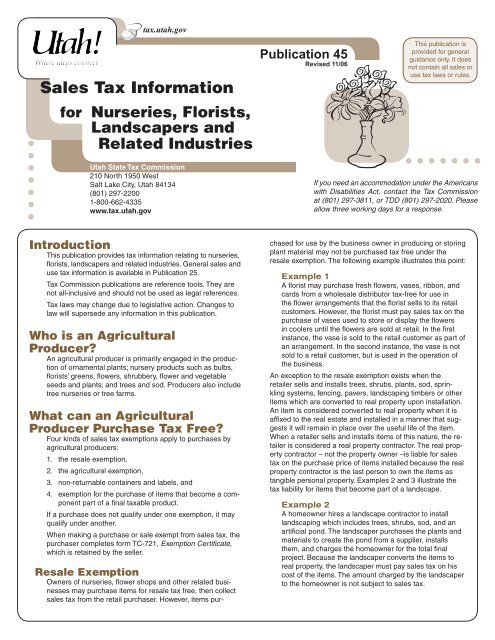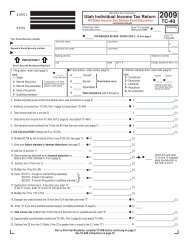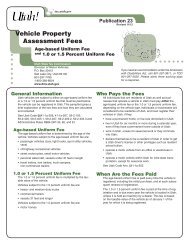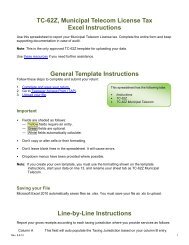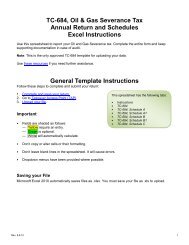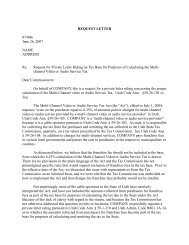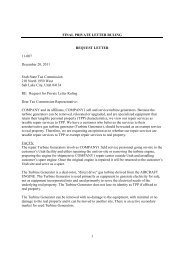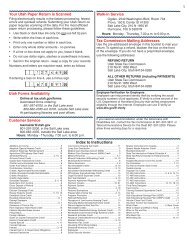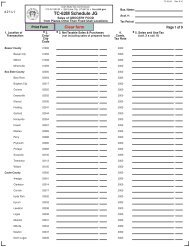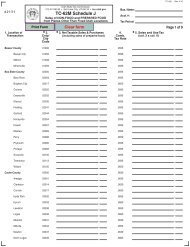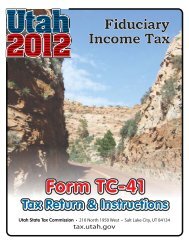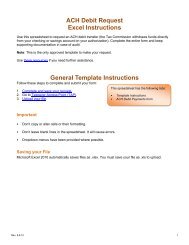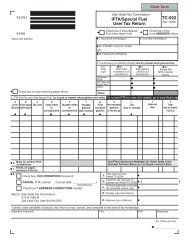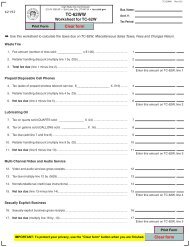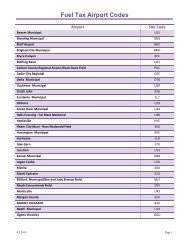Pub 45 - Utah State Tax Commission - Utah.gov
Pub 45 - Utah State Tax Commission - Utah.gov
Pub 45 - Utah State Tax Commission - Utah.gov
Create successful ePaper yourself
Turn your PDF publications into a flip-book with our unique Google optimized e-Paper software.
tax.utah.<strong>gov</strong><br />
Sales <strong>Tax</strong> Information<br />
for Nurseries, Florists,<br />
Landscapers and<br />
Related Industries<br />
<strong>Utah</strong> <strong>State</strong> <strong>Tax</strong> <strong>Commission</strong><br />
210 North 1950 West<br />
Salt Lake City, <strong>Utah</strong> 84134<br />
(801) 297-2200<br />
1-800-662-4335<br />
www.tax.utah.<strong>gov</strong><br />
Introduction<br />
This publication provides tax information relating to nurseries,<br />
fl orists, landscapers and related industries. General sales and<br />
use tax information is available in <strong>Pub</strong>lication 25.<br />
<strong>Tax</strong> <strong>Commission</strong> publications are reference tools. They are<br />
not all-inclusive and should not be used as legal references.<br />
<strong>Tax</strong> laws may change due to legislative action. Changes to<br />
law will supersede any information in this publication.<br />
Who is an Agricultural<br />
Producer?<br />
An agricultural producer is primarily engaged in the production<br />
of ornamental plants; nursery products such as bulbs,<br />
fl orists’ greens, fl owers, shrubbery, fl ower and vegetable<br />
seeds and plants; and trees and sod. Producers also include<br />
tree nurseries or tree farms.<br />
What can an Agricultural<br />
Producer Purchase <strong>Tax</strong> Free?<br />
Four kinds of sales tax exemptions apply to purchases by<br />
agricultural producers:<br />
1. the resale exemption,<br />
2. the agricultural exemption,<br />
3. non-returnable containers and labels, and<br />
4. exemption for the purchase of items that become a component<br />
part of a fi nal taxable product.<br />
If a purchase does not qualify under one exemption, it may<br />
qualify under another.<br />
When making a purchase or sale exempt from sales tax, the<br />
purchaser completes form TC-721, Exemption Certifi cate,<br />
which is retained by the seller.<br />
Resale Exemption<br />
Owners of nurseries, fl ower shops and other related businesses<br />
may purchase items for resale tax free, then collect<br />
sales tax from the retail purchaser. However, items pur-<br />
<strong>Pub</strong>lication <strong>45</strong><br />
Revised 11/06<br />
This publication is<br />
provided for general<br />
guidance only. It does<br />
not contain all sales or<br />
use tax laws or rules.<br />
If you need an accommodation under the Americans<br />
with Disabilities Act, contact the <strong>Tax</strong> <strong>Commission</strong><br />
at (801) 297-3811, or TDD (801) 297-2020. Please<br />
allow three working days for a response.<br />
chased for use by the business owner in producing or storing<br />
plant material may not be purchased tax free under the<br />
resale exemption. The following example illustrates this point:<br />
Example 1<br />
A fl orist may purchase fresh fl owers, vases, ribbon, and<br />
cards from a wholesale distributor tax-free for use in<br />
the fl ower arrangements that the fl orist sells to its retail<br />
customers. However, the fl orist must pay sales tax on the<br />
purchase of vases used to store or display the fl owers<br />
in coolers until the fl owers are sold at retail. In the fi rst<br />
instance, the vase is sold to the retail customer as part of<br />
an arrangement. In the second instance, the vase is not<br />
sold to a retail customer, but is used in the operation of<br />
the business.<br />
An exception to the resale exemption exists when the<br />
retailer sells and installs trees, shrubs, plants, sod, sprinkling<br />
systems, fencing, pavers, landscaping timbers or other<br />
items which are converted to real property upon installation.<br />
An item is considered converted to real property when it is<br />
affi xed to the real estate and installed in a manner that suggests<br />
it will remain in place over the useful life of the item.<br />
When a retailer sells and installs items of this nature, the retailer<br />
is considered a real property contractor. The real property<br />
contractor – not the property owner –is liable for sales<br />
tax on the purchase price of items installed because the real<br />
property contractor is the last person to own the items as<br />
tangible personal property. Examples 2 and 3 illustrate the<br />
tax liability for items that become part of a landscape.<br />
Example 2<br />
A homeowner hires a landscape contractor to install<br />
landscaping which includes trees, shrubs, sod, and an<br />
artifi cial pond. The landscaper purchases the plants and<br />
materials to create the pond from a supplier, installs<br />
them, and charges the homeowner for the total fi nal<br />
project. Because the landscaper converts the items to<br />
real property, the landscaper must pay sales tax on his<br />
cost of the items. The amount charged by the landscaper<br />
to the homeowner is not subject to sales tax.
<strong>45</strong><br />
Example 3<br />
A homeowner purchases plants, sod and materials for<br />
building an artifi cial pond. The homeowner then contracts<br />
with another party to install the items in the landscaping. In<br />
this case the homeowner is the last person to own the items<br />
as tangible personal property, and the homeowner must<br />
pay sales tax on the purchase price of these items. The<br />
installer is merely selling a non-taxable service. The charge<br />
by the installer to the homeowner is not subject to tax.<br />
The above examples describe items typically converted to<br />
real property upon installation. Example 4 demonstrates a<br />
landscape contract that includes items not converted to real<br />
property upon installation.<br />
Example 4<br />
Assume the landscaper in Example 2 also supplied<br />
moveable benches as part of the landscape. Because the<br />
benches will not be affi xed to the real property in a manner<br />
that suggests intent to leave them in place over their useful<br />
lives, they remain tangible personal property. The landscaper<br />
is a real property contractor with regard to the plants,<br />
sod and materials used to build the pond, but he is making<br />
a taxable retail sale of the benches to the homeowner. The<br />
landscaper will pay sales tax on his purchase of the items<br />
that will be converted to real property, but he may purchase<br />
the benches tax-free for resale. In billing the entire project<br />
to the homeowner, the landscaper must state the amount of<br />
tax imposed on the taxable items (the benches).<br />
Example 5<br />
A mall developer designs the mall facility to include a<br />
permanent indoor landscape, which includes long-term<br />
trees and shrubs. The developer contracts with a landscaper<br />
to provide and install the plants. As in Example<br />
2 above, the landscaper is acting as a real property<br />
contractor and must remit the sales tax on his purchase<br />
of the landscape plants.<br />
If the landscaper in these examples originally purchased the<br />
materials for the landscape tax-free, then converted them to real<br />
property under a furnish and install contract, the landscaper must<br />
report and pay sales tax on those items as goods consumed.<br />
Incorrect Seller Practices<br />
A seller that sells tangible personal property under a furnish<br />
and install contract (see examples 2 and 5) may not:<br />
1. collect sales tax on that tangible personal property;<br />
2. offset the use tax the seller owes on its own purchase of<br />
the tangible property by any sales tax the seller inappropriately<br />
collected on the sale of that property; or<br />
3. show the tax due on the seller/installer’s purchase of<br />
construction materials (or any amount labeled as tax,<br />
computed at the current tax rate, or that otherwise appears<br />
to be tax) as a separate item on an invoice or<br />
contract provided to the customer.<br />
A seller that inappropriately collects sales and use tax on<br />
property sold under a furnish and install contract is required<br />
by <strong>Utah</strong> law to remit the tax to the <strong>Tax</strong> <strong>Commission</strong>, unless<br />
the tax is refunded to the purchaser.<br />
Agricultural Exemption<br />
With the exceptions mentioned below, a commercial agricultural<br />
producer may purchase or lease tax-free all equipment, machinery,<br />
supplies and other tangible personal property used or consumed<br />
primarily and directly in agricultural production operations.<br />
Examples of items that may be purchased tax-free include:<br />
• Seed or seedlings, fertilizer, and sprays and insecticides used<br />
in the commercial production of plants to control insects,<br />
diseases or weeds. The exemption for sprays and insecticides<br />
used to control insects, diseases, and weeds in the commercial<br />
production of agricultural produce does not extend to<br />
sprays and insecticides used in the processing of the products.<br />
• Materials and supplies used to construct, repair or renovate<br />
an irrigation system, greenhouse, or other agricultural<br />
building.<br />
• Charges for labor and/or parts (including lubricating oil,<br />
antifreeze or other supplies) used to repair or maintain offroad<br />
machinery and equipment not required to be licensed<br />
or registered in <strong>Utah</strong> and used primarily and directly in<br />
agricultural production.<br />
Gas, electricity, heat, coal, fuel oil or other fuels used in agricultural<br />
operations to produce agricultural products for resale<br />
are not subject to sales tax. Qualifying uses include commercial<br />
greenhouses, irrigation pumps, equipment for heating<br />
orchards, off-highway farm machinery, and farming activities.<br />
The exemption applies to production activities up to the time<br />
of harvest or placing the product into a storage facility. If the<br />
electricity or gas for both qualifying and non-qualifying activities<br />
is delivered to a single location through a single meter,<br />
the determination depends on whether the electricity or fuel<br />
is used predominately for qualifying activities.<br />
The following are exceptions to this exemption, and an agricultural<br />
producer must pay sales tax when purchasing these items:<br />
• Items purchased for use in activities not directly related to<br />
agricultural production (e.g., purchases of offi ce equipment,<br />
janitorial supplies, equipment used in the sales or<br />
distribution operations, and equipment or supplies used in<br />
research or development).<br />
• Vehicles required under <strong>Utah</strong> law to be registered.<br />
• Equipment, supplies, tools or machinery used in a manner<br />
merely incidental to farming.<br />
• Storage bins and structures used to store previously harvested<br />
products held for resale.<br />
Non-returnable Containers and<br />
Labels<br />
Purchases of non-returnable containers, labels, bags, casings<br />
or shipping cases are exempt if used in packaging the<br />
product to be sold. For example, a nursery may sell shrubs<br />
in one-gallon containers. The one-gallon containers are nonreturnable<br />
packaging and the nursery may purchase them<br />
tax-free.<br />
In contrast, the nursery may also purchase plastic trays for<br />
the purpose of starting plants from seed. At some point the<br />
seedlings are transplanted from the trays to individual pots<br />
for resale. Because the plastic trays are not used as packaging<br />
for the fi nal product, the nursery cannot purchase them<br />
tax-free under this exemption.<br />
Component Part or Ingredient<br />
An item of tangible personal property purchased primarily<br />
as a raw material to be blended or compounded with other<br />
ingredients to make the fi nal taxable product qualifi es for<br />
exemption. If the item is purchased and consumed by the agricultural<br />
producer in the production process, it is not eligible<br />
for this exemption even if some of it becomes an incidental<br />
ingredient of the fi nal product.<br />
page 2
<strong>45</strong><br />
Example 6<br />
An agricultural producer grows and hybridizes lilies for<br />
sale as bare root plants. The grower purchases bulbs<br />
for use in growing more bulbs. The bulb is a necessary<br />
ingredient or component part of the fi nal product and is<br />
purchased tax-free.<br />
Example 7<br />
The lily grower also purchases topsoil for the planting<br />
beds in which the lilies are grown. The topsoil is not an<br />
ingredient of the fi nal product (the bare root plant). Instead<br />
it is used or consumed by the grower in the production<br />
process and the grower cannot purchase it tax-free as an<br />
ingredient or component part of the fi nal product.<br />
As mentioned above, purchases excluded from one exemption<br />
may be eligible for another. For example, pesticide<br />
purchased for use on plants grown for resale is not eligible<br />
for exemption as an ingredient or component part of the fi nal<br />
product. It is, however, eligible for the agricultural exemption.<br />
The agricultural producer may purchase an item tax-free if<br />
the item or purchase fi ts within any one of the exemptions<br />
described.<br />
What Can an Agricultural<br />
Producer Sell <strong>Tax</strong>-Free?<br />
A seller who sells items of tangible personal property or<br />
provides services must collect and remit sales tax on that<br />
sale unless the sale is exempt under one of the exemptions<br />
described in this section.<br />
Sale for Resale<br />
An agricultural producer may sell items of tangible personal<br />
property tax-free if the purchaser provides the agricultural<br />
producer with a resale exemption certifi cate.<br />
Example 8<br />
A sod farm operator sells sod to a nursery for resale to<br />
its retail customers. The sale by the operator to the nursery<br />
is tax exempt under the resale exemption. The sale<br />
by the nursery to the retail customer is taxable.<br />
Example 9<br />
A sod farm operator sells sod directly to a homeowner<br />
for installation by the homeowner. This is a retail sale<br />
that does not qualify for exemption as a sale for resale,<br />
unless it fi ts within the exemption for sales of seasonal<br />
produce described in the next section.<br />
Sale of Seasonal Produce<br />
The exclusive sale of seasonal garden or farm crops or<br />
seedlings and plants sold during the harvest season is<br />
exempt if sold by:<br />
• The agricultural producer;<br />
• An employee of the producer; or<br />
• A member of the producer’s immediate family.<br />
If the producer, producer’s employee, or producer’s immediate<br />
family member sells anything other than the producer’s<br />
qualifying seasonal crops, the producer is operating a retail<br />
establishment and must collect sales tax on all sales.<br />
Example 10<br />
A farmer produces corn and sells it at a roadside stand<br />
during the harvest season. If the farmer is selling only his<br />
own seasonal crops through the stand, the farmer does<br />
not collect and remit sales tax on the sales. If the farmer<br />
sells anything other than qualifying seasonal crops at<br />
the roadside stand, he must collect sales tax on all retail<br />
sales, including sales of his corn.<br />
Example 11<br />
A nursery grows annuals for sale to the public. It also<br />
sells a full line of nursery products including trees,<br />
shrubs, perennials, garden tools, fertilizer, insecticide,<br />
and gardening books. Although the annuals constitute<br />
a seasonal crop grown by the nursery, the nursery is<br />
engaged in selling other items at retail. The nursery is a<br />
retailer and must collect and report sales tax on all of its<br />
sales, including sales of annuals.<br />
Example 12<br />
A sod farmer grows sod in <strong>Utah</strong> and Idaho. He sells<br />
sod to the public at his <strong>Utah</strong> location during the harvest<br />
season. He does not sell sod purchased from other sod<br />
farmers. The sod farmer does not collect sales tax from<br />
his customers because he is only selling sod he produces<br />
during the harvest season.<br />
Sales of Hay<br />
All sales of hay are exempt from sales tax.<br />
Nontaxable Services<br />
The following example illustrates services that are provided<br />
tax-free.<br />
Example 13<br />
Charges for fertilizing, mowing or other yard maintenance<br />
are not taxable.<br />
Sales tax publications provide general guidance only.<br />
They do not contain all sales or use tax laws or rules. If<br />
you need additional information, call (801) 297-7705 or<br />
1-800-662-4335, ext. 7705 (outside the Salt Lake area), or<br />
email taxmaster@utah.<strong>gov</strong>.<br />
page 3


